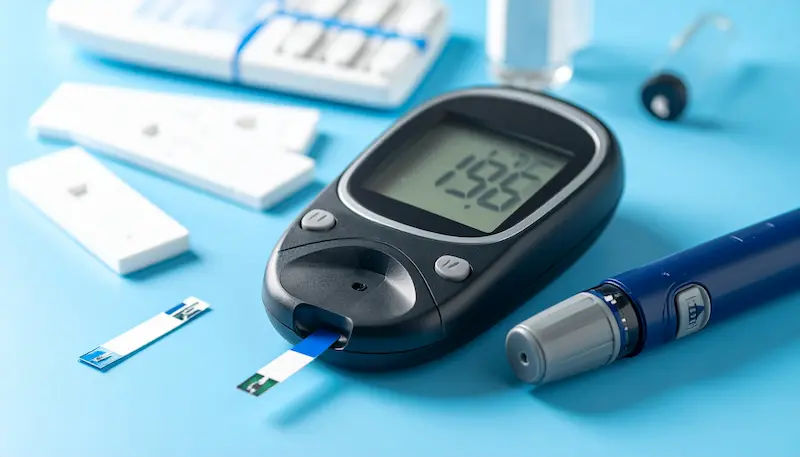Causes of High Blood Pressure in Young Adults
Discover the common causes of high blood pressure in young adults, including lifestyle factors, genetics, and underlying health conditions, and learn how to manage them.

Written by Dr. Vasanthasree Nair
Reviewed by Dr. Mohammed Kamran MBBS, FIDM
Last updated on 13th Jan, 2026

Introduction
Gone are the days when high blood pressure was considered an exclusive concern of older adults. A silent and alarming shift is occurring in clinics and hospitals worldwide: a steep rise in hypertension among young adults in their 20s and 30s. Often dismissed as temporary stress or a fluke, this condition can set the stage for serious long-term health complications if left unaddressed. This article delves deep into the "why" behind this trend, exploring the complex web of lifestyle choices, underlying medical conditions, and genetic factors that lead to high blood pressure in a younger demographic. We'll move beyond just identifying the causes to provide an actionable guide on recognition, management, and prevention, empowering you to take control of your cardiovascular health today.
Understanding the Basics: What is High Blood Pressure?
High blood pressure, or hypertension, is a condition where the force of your blood pushing against the walls of your arteries is consistently too high. This relentless pressure forces your heart and blood vessels to work much harder, leading to gradual damage over time.
Systolic vs. Diastolic: Reading the Numbers
When you get a reading, like 120/80 mmHg, you're seeing two numbers:
Systolic pressure (the top number): The pressure in your arteries when your heart beats.
Diastolic pressure (the bottom number): The pressure in your arteries when your heart rests between beats.
Hypertension in adults is typically diagnosed when readings are consistently at or above 130/80 mmHg.
Why It's a "Silent Killer" for the Young
The most insidious aspect of high blood pressure is its silence. It rarely presents obvious symptoms, especially in the early stages. A young person can live for years with undiagnosed hypertension, all while damage accumulates in their arteries, heart, kidneys, and brain. This lack of overt warning signs makes proactive screening and awareness absolutely critical.
Health topic carousel:
Doctor's speciality: General Physician
Text: Consult a General Physician for the best advice
The Primary Culprits: Common Causes of Hypertension in Young Adults
The reasons behind rising blood pressure in youth are multifaceted, often involving a combination of factors.
Lifestyle Factors You Can Control
Modern lifestyles play a starring role in this public health issue.
1. The Salt Trap: Diet and Sodium Intake
The modern diet is saturated with processed foods, fast food, and snacks, all of which are loaded with sodium. Excess sodium causes your body to retain water, increasing the volume of blood and, consequently, the pressure on your artery walls.
2. Sedentary Life: Lack of Physical Activity
A desk-bound job coupled with sedentary leisure activities (scrolling, gaming, binge-watching) is a recipe for weight gain and poor cardiovascular fitness. Inactivity contributes to weaker heart muscles and stiffer arteries, both of which can elevate blood pressure.
3. Stress and Anxiety: The Modern Epidemic
Chronic stress from work, finances, and social pressures keeps your body in a constant "fight-or-flight" mode. This floods your system with hormones like cortisol and adrenaline, which temporarily increase your heart rate and constrict blood vessels, leading to sustained high blood pressure.
4. Alcohol and Tobacco Use
Regular heavy drinking can dramatically raise blood pressure. Similarly, the chemicals in tobacco damage the lining of your arteries, causing them to narrow and harden. Vaping, often perceived as safer, still delivers nicotine, which is a known vasoconstrictor.
Underlying Medical Conditions
In some cases, hypertension is secondary to another health problem, especially if it appears suddenly or is severe.
1. Kidney Disease and Hormonal Disorders
Your kidneys play a key role in regulating blood pressure by controlling fluid balance. Kidney disease can impair this function. Conditions like Cushing's syndrome or aldosteronism involve hormone imbalances that directly impact blood pressure regulation.
2. Thyroid Problems and Adrenal Issues
Both an overactive (hyperthyroidism) and underactive (hypothyroidism) thyroid can cause hypertension. Tumors on the adrenal glands (e.g., phaeochromocytoma) can also cause sporadic, severe spikes in pressure.
3. The Role of Obesity and Sleep Apnoea
Excess weight, particularly around the abdomen, is a major risk factor. It's closely linked to sleep apnoea, a condition where breathing repeatedly stops and starts during sleep. This disrupts oxygen levels and strains the cardiovascular system, significantly increasing the risk of hypertension.
Genetic Factors and Family History
You can't change your genes. If you have a close family member (parent or sibling) with hypertension, your risk is inherently higher. This doesn't guarantee you'll develop it, but it means you need to be extra vigilant about managing the controllable lifestyle factors.
Beyond the Numbers: Recognizing the Symptoms
High blood pressure isn’t always obvious from readings alone. Here are the symptoms and signs to watch for:
Often Silent: The Absence of Obvious Signs
Most young adults with high blood pressure feel perfectly fine. This is why it's often discovered during a routine check-up for something else, like a sports physical or an employment medical exam.
When to Pay Attention: Severe Symptoms
If blood pressure reaches a dangerously high level (a hypertensive crisis), symptoms may appear. These require immediate medical attention and include:
Severe headaches
Nosebleeds
Shortness of breath
Chest pain
Severe anxiety
Vision changes
If you experience any of these, it is crucial to consult a doctor online with Apollo24|7 for an immediate evaluation or seek emergency care.
How is High Blood Pressure Diagnosed in Young People?
Diagnosis isn't based on a single high reading. A doctor will typically:
1. Take multiple readings over time.
2. Recommend ambulatory blood pressure monitoring (ABPM), where you wear a device for 24 hours to get a true picture of your daily fluctuations.
3. Run tests to rule out secondary causes, especially in young adults. Apollo24|7 offers a convenient home collection for tests like kidney function, thyroid panels, and cholesterol checks, which can help paint a complete picture of your health.
Health topic carousel:
Lab Test: Renal Function Test (RFT/KFT), Thyroid Profile (T3, T4, TSH) Test, and Cholesterol Test
Text: Get Your Health Assessed
The Long-Term Risks: Why Early Intervention is Critical
Ignoring high blood pressure in your youth is like ignoring a ticking time bomb for your future health. Uncontrolled hypertension accelerates the hardening and narrowing of arteries (atherosclerosis), leading to:
Heart Disease and Heart Failure: The overworked heart muscle can thicken and become inefficient.
Stroke: Weakened arteries in the brain can burst or become blocked.
Aneurysm: Increased pressure can cause a bulge in a blood vessel wall, which can rupture.
Kidney Damage: Arteries supplying the kidneys can become damaged, leading to kidney failure.
Vision Loss: Damage to the delicate blood vessels in the eyes can occur.
Taking Control: Effective Management and Treatment
The good news is that high blood pressure is highly manageable, and often reversible, in young adults.
First-Line Defense: Lifestyle Modifications
This is the cornerstone of treatment:
Adopt a Heart-Healthy Diet: Embrace the DASH (Dietary Approaches to Stop Hypertension) diet, rich in fruits, vegetables, whole grains, and lean proteins while being low in sodium and saturated fat.
Get Moving: Aim for at least 150 minutes of moderate-intensity aerobic exercise (like brisk walking, cycling, or swimming) per week.
Manage Stress: Incorporate mindfulness, meditation, yoga, or deep-breathing exercises into your daily routine.
Limit Alcohol and Quit Tobacco: This is non-negotiable for cardiovascular health.
When Medication is Necessary
If lifestyle changes aren't enough to bring your blood pressure under control, a doctor may prescribe medication. Common types include ACE inhibitors, ARBs, diuretics, or calcium channel blockers. The goal is to find the most effective medication with the fewest side effects.
Prevention is Better Than Cure: Proactive Steps for a Healthy Heart
The best strategy is to never develop hypertension in the first place. By integrating the lifestyle modifications listed above, eating well, staying active, managing stress, and avoiding tobacco, you can significantly reduce your risk. Regular monitoring, even if you feel healthy, is the key to early detection.
Conclusion
The rise of high blood pressure in young adults is a clear call to action. It underscores the profound impact our daily choices have on our long-term health. While genetics play a role, the power to influence your cardiovascular destiny lies largely in your hands. By understanding the causes, from the hidden sodium in your diet to the unmanaged stress in your life, you can make informed decisions. Start today by scheduling a check-up to know your numbers, reassessing your lifestyle, and taking proactive steps. If your readings are consistently high, don't wait; consult a doctor online with Apollo24|7 to create a personalised management plan and safeguard your health for years to come.
Frequently Asked Questions (FAQs)
Below are the FAQs:
1. Can high blood pressure in young adults be reversed?
A. Yes, in many cases, especially when it's primarily driven by lifestyle factors. Through consistent dietary changes, regular exercise, weight management, and stress reduction, many young adults can normalize their blood pressure without the need for long-term medication.
2. What is considered normal blood pressure for a 25-year-old?
A. The guidelines are the same for all adults. A normal blood pressure reading is typically less than 120/80 mmHg. Elevated blood pressure is between 120-129/<80 mmHg, and Stage 1 Hypertension is 130-139/80-89 mmHg.
3. I'm fit and exercise regularly. Can I still have high blood pressure?
A. Yes. While being fit lowers your risk, other factors like a high-salt diet, genetic predisposition, or an underlying medical condition (like a thyroid disorder) can still cause hypertension. This is why regular screening is important for everyone.
4. How often should a young adult get their blood pressure checked?
A. If your blood pressure is normal (under 120/80 mmHg), you should get it checked at least once every two years. If you have risk factors (family history, obesity, poor diet) or have had elevated readings in the past, you should check it at least once a year, or more frequently as advised by your doctor.
5. Are headaches a common sign of high blood pressure?
A. Generally, no. Hypertension is typically symptomless. Headaches usually only occur during a hypertensive crisis (severely high blood pressure), which is a medical emergency. Relying on symptoms is not a safe strategy; measurement is key.
Health topic carousel:
Doctor's speciality: General Physician
Text: Consult a General Physician for the best advice

.webp)


